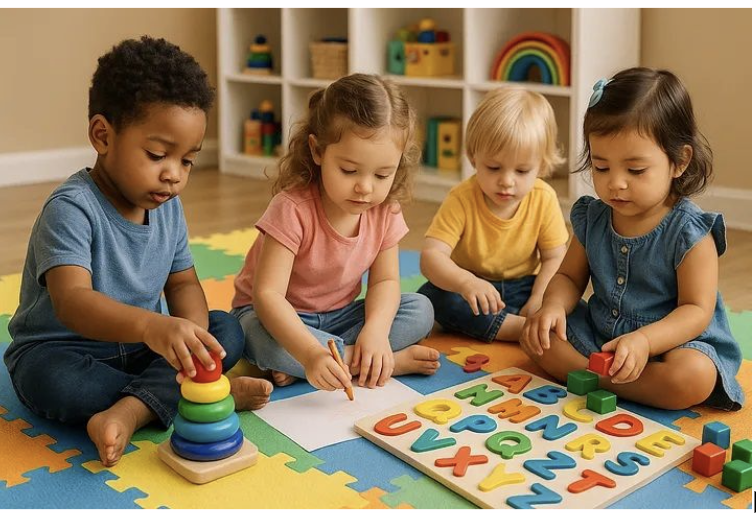What a Child Development Center Offers: Programs for Every Child’s Needs
Home / Blog

Every child is different, and their growth path is different. While some children naturally reach developmental milestones on time, others may struggle with communication, motor skills, learning, or emotional regulation. Recognizing these differences early is critical for providing timely support and guidance. A Child Development Center (CDC) plays an important role in this situation.
A Child Development Center is a specialized facility that provides evaluation, therapy, and educational programs to children with various needs. These centers have multidisciplinary teams that provide personalized care for each child, promoting growth and well-being.
This blog explores deeply into the offerings of child development centers and how their specialized programs meet the unique developmental needs of each child.
1. Comprehensive Assessment and Early Detection
A comprehensive assessment is the first step at any child development center. Children are assessed in a variety of ways:
Motor and physical abilities
Learning capacities and cognitive development
Development of speech and language
Emotional and social abilities
It’s critical to detect delays or difficulties early. Child development centers can significantly improve a child’s capacity to catch up with peers and acquire critical life skills by identifying problems early and implementing timely interventions.
2. Specialized Therapy Programs
Child development centers provide a variety of targeted therapy programs designed to meet individual needs. These include:
a) Cerebral Palsy Rehabilitation
Movement, balance, and coordination are all impacted by cerebral palsy. CDCs’ rehabilitation programs use physiotherapy, occupational therapy, and assistive technology to improve motor skills, posture, and functional independence.
b) Autism Rehabilitation
Children on the autism spectrum frequently require assistance with social interaction, behavior, and communication. To improve everyday functioning and social engagement, autism programs provide structured therapies such as behavioral therapy, social skills training, and sensory integration techniques.
c) Learning Disability Clinic
Academic progress can be stopped by learning disabilities like dyslexia, dyscalculia, or ADHD. Specialized clinics offer therapy sessions, tutoring, and individualized learning plans to help kids overcome learning obstacles and achieve academic success.
d) Child Psychology Clinic
A child’s overall development can be impacted by emotional and behavioral issues. To help kids deal with stress, anxiety, and social challenges, child psychology programs offer behavioral interventions, counseling, and coping mechanisms.
e) Speech Therapy
Speech and language development are necessary for effective communication. Children who participate in speech therapy programs gain confidence in their ability to express themselves by improving their vocabulary, articulation, pronunciation, and social communication skills.
f) Occupational Therapy
The goal of occupational therapy is to assist kids in carrying out everyday duties on their own. This promotes independence and self-assurance through the development of fine motor skills, hand-eye coordination, sensory processing, and self-care practices.
g) Physiotherapy
Physical mobility, strength, flexibility, and coordination are the main goals of physiotherapy programs, particularly for kids who are recovering from surgeries, injuries, or physical disabilities.
h) Special Education Programs
Programs for special education provide customized lesson plans based on the social and academic requirements of each child. Children with special needs are given equal learning opportunities in inclusive classrooms, where they also gain confidence and social skills.
3. Multidisciplinary Team Approach
The team-based approach of child development centers is one of their biggest benefits. To create a thorough care plan, pediatricians, therapists, psychologists, special educators, and counselors work together. Every facet of a child’s development—physical, cognitive, emotional, and social—is methodically addressed thanks to this holistic approach.
4. Parent Involvement and Guidance
Child development centers understand that parents play a crucial role in their child’s development. To help parents with at-home activities, reinforcement methods, and ways to support their child’s development outside of the clinic, centers offer training, workshops, and counseling sessions.
5. Benefits of Visiting a Child Development Center
There are many benefits to visiting a child development center, such as:
- Early detection and treatment of developmental delays
- Having access to specialized treatments in one location
- Care plans that are customized to meet the needs of each child
- Multidisciplinary assistance for comprehensive development
- Enhanced cognitive, emotional, and social abilities
- Increased self-assurance and self-reliance
- Improved readiness for school and sustained academic achievement
6. Preparing Children for a Brighter Future
Children can overcome challenges and reach milestones that may have seemed impossible at first with the correct help. Child development centers give kids the academic support, emotional fortitude, and life skills they need to succeed in school, social situations, and everyday routines.
Final Thoughts
A child development center is a caring setting where kids with a range of needs can develop, learn, and flourish. It’s more than just a clinic. These centers offer the resources and assistance required to enable every child to realize their full potential, from early detection and assessment to specialized therapy programs and parental guidance.
Early attendance at a child development center can significantly impact your child’s growth path if you have noticed developmental issues or difficulties in them.
